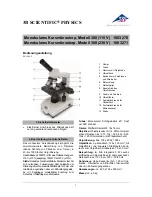
and prevents damage to specimen slides and optics. The travel stop has been
previously set, at the factory, but may have shifted slightly because of shipping. By
following the focusing procedures, outlined previously, it will become obvious if
the travel stop is set too low.
To properly set the stops, place a slide on the stage while the stage is in it lowest
position. The 40X objective should be rotated into place. CAREFULLY and SLOWLY
move the stage upward (using the course-focus adjustment knobs) until the slide
almost touches the front lens of the objective (continued, last page).
GREAT CARE MUST BE TAKEN THAT THE TWO SURFACES DO NOT MEET BY
OBSERVING THE OPERATION CLOSELY FROM THE SIDE OF THE STAGE. FAILURE TO
EXERCISE THIS CAUTION MAY RESULT IN DAMAGE TO THE SPECIMEN AND
OBJECTIVE. The stage is now correctly positioned to set the travel stop by turning
the knurled screw until it seats against the stage carrier, within the microscope.
Now properly set, it should not be possible to move the stage upward past this
point using the course-focus adjustment.
FOCUS CONTROL (stage type): The Wolfe
CFL Series microscope utilizes a fixed
body tube. Focus is achieved through use of separate course and fine-focus
adjustment knobs located on the lower half of the microscope arm and block,
below the stage. You should notice vertical movement of the stage when focusing
an image. NOTE: On one side of the microscope, between the course-focus knob
and stand, is a knurled tension collar. Clockwise rotation of the collar increases
tension of the course-focus adjustment.
BUILT-IN FLOURESCENT ILLUMINATOR: Your microscope has a built-in fluorescent
illuminator. AS A PRECAUTION, GROUNDED ELECTRICAL SERVICE SHOULD ALWAYS
BE PROVIDED WHEN USING THE MICROSCOPE. To change the bulb, first, disconnect
the microscope from the electrical supply and use a Phillips head screwdriver to
remove the four rubber feet beneath the base of the microscope stand. Once the
feet are removed, it will be possible to take off the metal plate beneath them,
exposing the bulb and socket. To remove the bulb, grasp the glass tubes with a
towel and
gently pull forward, away from the socket until the bulb disengages.
Reverse this procedure when installing a replacement lamp. TO ENSURE OPTIMAL
BULB PERFORMANCE, BE CERTAIN THAT ITS GLASS SURFACE REMAINS CLEAN AND
FREE FROM FINGERPRINTS.
Replacement Fluorescent Lamp Item # 595540 on the Carolina Website.
Содержание 590950
Страница 5: ...Parts Identification on the 590950...
Страница 6: ...Parts Identification on the 590955...

























